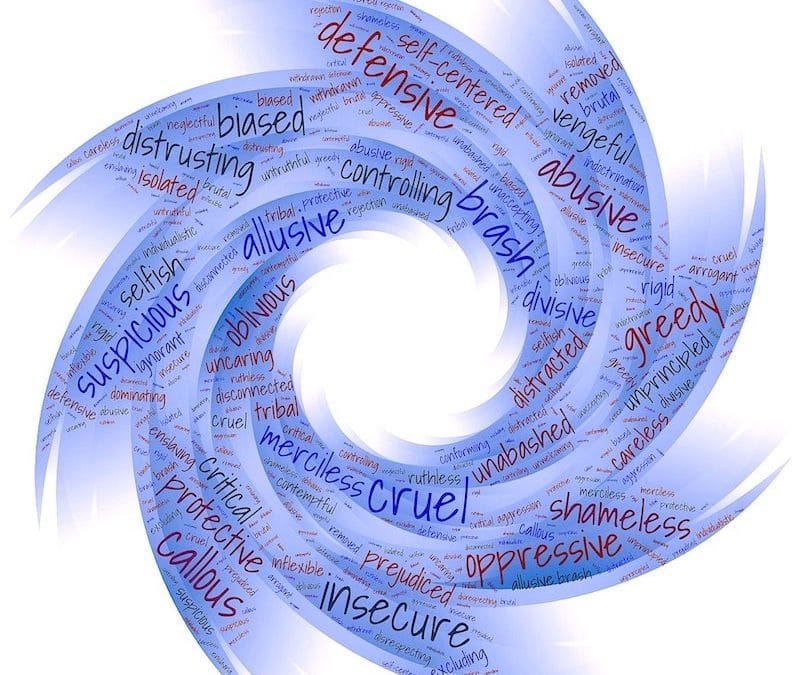
6 Lazy Ways to be Unintentionally Not Kind
Fortunately, I do not know anyone who sets out on their day intending to be not kind to anyone at all. It’s probably the same for you too. So why is it that in any ordinary day all sorts of unkind things happen?
Let’s look at our own behaviour at work. We could ask ourselves if in the rough and tumble of an average working day we find ourselves unintentionally being not kind. The thing is that individually each action may seem so small as to be insignificant. It can be the cumulative effect which is damaging.
Often it is because of habit, or insecurity, or pressure that we fall short in being kind. So, here is my list of six lazy ways it is easy to fall into being not kind. I call them ‘lazy’ because they are not necessarily intentional—in fact, usually they aren’t. They are largely due to not noticing what is going on with other people, or how your behaviour is affecting them.
1. Being pre-occupied can mean being not kind
When we are stressed, or really busy then it is all too easy to become turned in on ourselves. Our priorities take centre stage and our ability to see what is going on around us is reduced.
At work this can easily become a sense of self-importance. This can lead to the feeling that what you are doing is so vital that it takes precedence over everything else. It gives us permission to prioritise our own story and not pay so much attention to other peoples’.
It can creep up on you in quite a subtle way. From your point of view, you are simply trying to do a good job. There is no intention to let your kindness slip but that is what happens when you become too self-focused. You don’t give your full attention to the needs of people around you and you miss things.
2. Gossip can lead to unkindness
I would be willing to bet that you are not the workplace gossip at your job. They are usually pretty easy to spot and not so difficult to politely avoid. It’s much more difficult to manage your own reactions and emotions without unintentionally being not kind.
If you are in any kind of team-leader, management role everything you say has an enhanced significance for the rest of the team. When someone in your team is struggling then how you talk about them in the group is very important. You need to find a way to give them difficult feedback without damaging their confidence and their ability to learn. They will be listening to every word you say, and what others tell them you said with a sensitivity heightened by fear and anxiety.
Whatever your role is, there are always people at work who are less easy to get on with than others. It is these people that you need to take special care to talk to and talk about with great skill. Just one off the cuff comment made in irritation can cause tremendous harm.
3. Criticism
How does your workplace handle feedback and constructive criticism? It’s another example of something that, when it is done well, can help a colleague move through challenges. However, if it is done without kindness then it can be an enormous blow.
Most of us have probably experienced receiving both kinds of feedback ourselves. One of my most useful work experiences was when a colleague—not a boss, or manager—asked to talk to me and set out to inform me of all my faults as she saw them. It was a devastating experience but when I recovered, I realised I had an excellent list of what not to do if you want to give someone helpful feedback. I still draw on that list to this day.
The main thing that I realised was you need to give the kind of feedback that would be helpful to you, yourself. That is the only feedback that people can really hear and respond to.
4. Blame will make you not kind
According to research, blaming mistakes on other people is socially contagious. Observing someone blaming their mistakes on other people can lead to you doing the same thing to protect your image. Such a cycle does not help anyone.
In a workplace where blame is part of the norm, staff are less likely to succeed, and much less likely to be creative. Anyone who is in the habit of blaming others misses out as well. You don’t get the chance to learn from your mistakes if you don’t take responsibility for them.
It seems that optimistic people blame less, and pessimistic people more—with the prize going to narcissists.
For most of us the time to watch out for lazily blaming someone else for a mistake is when we are tired, worried, or over-worked. It’s not that we want someone else to get into trouble—it’s just that we don’t want to have to deal with it ourselves.
5. Bullying
It would seem that kindness and bullying are pretty far apart—how could someone interested in promoting kindness also engage in any kind of bullying activity?
Let’s take it down a notch—instead of bullying think of steamrollering, pressurising, over-persuading someone. When I think back to my years of managing an international non-profit, I am pretty sure that I used tactics like this. I was convinced that what I was doing was so important that people needed to get on board. Indeed, what I was doing was important, but I forgot to treat each person I dealt with as an individual, with their own strengths and weaknesses. I wanted everyone to go at my pace and it exhausted some people.
Does your enthusiasm and passion for your work ever translate as pressure for other people?
6. Not listening is not kind
Once again, we rarely simply ignore someone when they speak to us—especially at work—but we often listen in a distracted way. We’re busy, the speaker is taking too long to make their point, and so our attention wanders. The thing is that we feel it when someone is not giving us their full attention and it’s unsettling. Our ability to communicate is reduced.
When we don’t listen with full attention then we don’t hear all the levels that are being communicated and we don’t pick up on the accompanying body language, or emotional signs. That’s where the unkindness can come in. We miss stuff—someone’s concern, or even distress—and the person feels overlooked. Maybe it is simply information that we don’t completely process, which leads to mistakes further down the road.
It’s not only distraction which blocks our listening, it can be our opinions and prejudices as well. If we think differently to the speaker, we tend to listen through a critical web which filters out the points we just want to refute. It’s even worse if we don’t like the person who is talking to us because then we listen through a whole range of remembered slights and disagreements.
Wanting to fix what the person is telling you can also get in the way of listening deeply to what they are saying. We are so busy thinking of the response we want to make to put them right that we don’t listen fully to what we are being told.
Something to remember
None of us is perfect and there will be days at work where our kindness might be less than others but watching out for these six lazy ways we can be not kind can become a good reminder. For me, the underlying basic principle is to try and put myself in the shoes of the other person, or people. An easy way to do this is to ask how you yourself would feel if you were being treated in any of these six ways. Think how it feels to be the subject of gossip, or to receive withering criticism. No-one wants to be pressured to behave in a certain way and no-one enjoys being blamed—especially when the blame is unfair. We are all busy and trying our best and we all like to be listened to with kindness. Remembering this is a basic key to avoiding being not kind.

If you have found the ideas in this post interesting you might like to look at my new online course, How to Make Kindness Matter at Work. You can find out more here.

